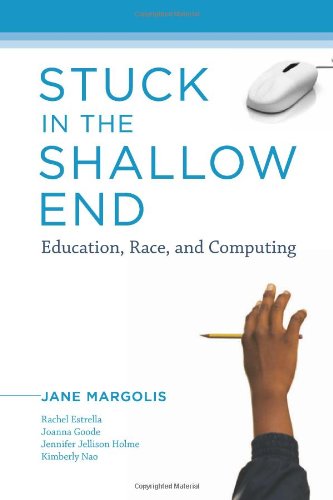Non-Fiction: The Economy Class & Consumerism
Explore top non-fiction books on economy class and consumerism. Discover insightful reads that delve into economic trends, consumer behavior, and societal impacts. Perfect for students and enthusiasts.













Book
Stuck in the Shallow End
by Jane Margolis
The number of African Americans and Latino/as receiving undergraduate and advanced degrees in computer science is disproportionately low, according to recent surveys. And relatively few African American and Latino/a high school students receive the kind of institutional encouragement, educational opportunities, and preparation needed for them to choose computer science as a field of study and profession. In Stuck in the Shallow End, Jane Margolis looks at the daily experiences of students and teachers in three Los Angeles public high schools: an overcrowded urban high school, a math and science magnet school, and a well-funded school in an affluent neighborhood. She finds an insidious "virtual segregation" that maintains inequality. Two of the three schools studied offer only low-level, how-to (keyboarding, cutting and pasting) introductory computing classes. The third and wealthiest school offers advanced courses, but very few students of color enroll in them. The race gap in computer science, Margolis finds, is one example of the way students of color are denied a wide range of occupational and educational futures. Margolis traces the interplay of school structures (such factors as course offerings and student-to-counselor ratios) and belief systems -- including teachers' assumptions about their students and students' assumptions about themselves. Stuck in the Shallow End is a story of how inequality is reproduced in America -- and how students and teachers, given the necessary tools, can change the system.


Book
Ecology of a Cracker Childhood
by Janisse Ray
A memoir of a childhood, spend in an isolated Georgia community of Crackers, that grew into a passion to save the vanishing longleaf pine ecocystem in which she was raised.

Book
The Travels of a T-Shirt in the Global Economy
by Pietra Rivoli
Pietra Rivoli is an economics professor at Georgetown University, where the question "Who made your T-shirt?" set her on a quest. On her journey she found that globalization is just as much about history and politics as it is about economics.








Book
Freakonomics
by Steven D. Levitt
Which is more dangerous, a gun or a swimming pool? What do schoolteachers and sumo wrestlers have in common? How much do parents really matter? These may not sound like typical questions for an economist to ask. But Steven D. Levitt is not a typical economist. He studies the riddles of everyday life—from cheating and crime to parenting and sports—and reaches conclusions that turn conventional wisdom on its head. Freakonomics is a groundbreaking collaboration between Levitt and Stephen J. Dubner, an award-winning author and journalist. They set out to explore the inner workings of a crack gang, the truth about real estate agents, the secrets of the Ku Klux Klan, and much more. Through forceful storytelling and wry insight, they show that economics is, at root, the study of incentives—how people get what they want or need, especially when other people want or need the same thing.

Book
Super Freakonomics
by Steven D. Levitt
The New York Times best-selling Freakonomics was a worldwide sensation, selling over four million copies in thirty-five languages and changing the way we look at the world. Now, Steven D. Levitt and Stephen J. Dubner return with SuperFreakonomics, and fans and newcomers alike will find that the freakquel is even bolder, funnier, and more surprising than the first. Four years in the making, SuperFreakonomics asks not only the tough questions, but the unexpected ones: What's more dangerous, driving drunk or walking drunk? Why is chemotherapy prescribed so often if it's so ineffective? Can a sex change boost your salary? SuperFreakonomics challenges the way we think all over again, exploring the hidden side of everything with such questions as: How is a street prostitute like a department-store Santa? Why are doctors so bad at washing their hands? How much good do car seats do? What's the best way to catch a terrorist? Did TV cause a rise in crime? What do hurricanes, heart attacks, and highway deaths have in common? Are people hard-wired for altruism or selfishness? Can eating kangaroo save the planet? Which adds more value: a pimp or a Realtor? Levitt and Dubner mix smart thinking and great storytelling like no one else, whether investigating a solution to global warming or explaining why the price of oral sex has fallen so drastically. By examining how people respond to incentives, they show the world for what it really is – good, bad, ugly, and, in the final analysis, super freaky. Freakonomics has been imitated many times over – but only now, with SuperFreakonomics, has it met its match.



